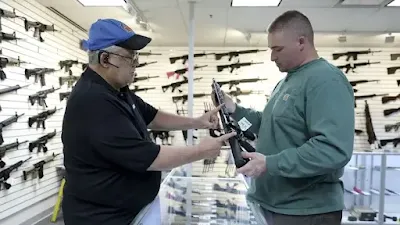In article the "How to curb gun violence: States should ban corporations from selling guns," from The Hill advocating for severe restrictions on gun sales at the state level, Candidate Scott Budow (D) asserts, “On November 7, the U.S. Supreme Court will hear argument in U.S. v. Rahimi to determine whether laws that prohibit possession of firearms by persons subject to restraining orders are constitutionally permissible.” However, this perspective misinterprets the constitutional protections afforded by the Second Amendment and disregards the crucial role of due process in American jurisprudence.
Find Guns & Ammo on Gun Coyote | The Gun Deals Search Engine
The argument to focus on state-level reforms to restrict the sale of firearms oversimplifies the complex nature of gun violence and its root causes. While the article argues that “gun reform advocates need to focus on the states, not the federal government,” this approach ignores the foundational principle that the right to keep and bear arms is not granted by the state but is enshrined in the Constitution and recognized as pre-existing the government itself.
Furthermore, the suggestion that “we can pass laws to close gun stores in the 17 states where Democrats have unified control,” and the proposition to force businesses to “either stop selling guns or stop doing business in our state,” not only impinge upon the free market but also upon the freedoms of law-abiding citizens. The premise that shutting down lawful gun stores would "stem the tide" of gun violence is speculative and unsupported by evidence, as it does not address the predominant sources of firearms used in crimes, which are often obtained illegally.
The article rightly points out that “the Constitution does not protect [the activity of selling arms],” in the context of illegal gun sales. However, conflating lawful and regulated firearm commerce with illegal gun trafficking is misleading. The legal purchase of firearms, with the myriad of checks and balances in place, is not the problem; rather, it is the criminal misuse of firearms that should be addressed.
Indeed, “if one state leads, others will follow,” but this notion cuts both ways. Restrictive gun laws often lead to legal challenges and public backlash as they can be perceived as overreach by the government into the constitutional rights of its citizens. The article acknowledges the Supreme Court's protection of individual possession of firearms, a recognition that aligns with the understanding that the right to self-defense is fundamental and not to be infringed lightly.
The claim that “if the law succeeds in reducing gun violence, other states across the political divide may also become interested in following” is speculative. Policy must be driven by clear evidence and respect for constitutional rights, not by a reactionary stance to a complex issue. Moreover, many measures such as background checks and waiting periods, already in place, are supported because they are reasonable, targeted, and do not blanketly infringe upon the rights of the populace.
To address gun violence effectively, we must target the actual causes of crime, which include socioeconomic factors, mental health issues, and the enforcement of current laws. A proactive approach to education, community engagement, and law enforcement's ability to enforce existing laws would be a more balanced and constitutionally sound strategy than the wholesale closure of gun stores, which punishes the many for the actions of the few.
The measures proposed in the article may be well-intentioned but they run counter to the principles of liberty, due process, and economic freedom. We need not sacrifice our constitutional rights in the pursuit of safety; rather, we must seek to uphold the delicate balance between the two, which is the hallmark of a free and just society.


No comments:
Post a Comment